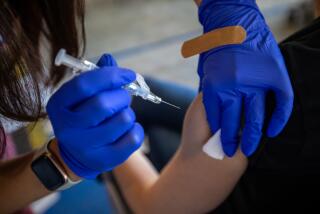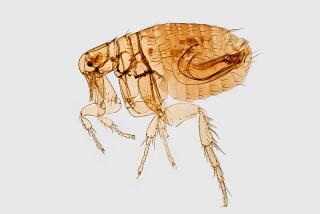Deadly L.A.-area meningitis cases raise concerns in gay community

Public health officials are urging men in Los Angeles County’s gay community to get vaccinated against meningitis after three men died of the deadly bacterial disease this week.
As three people were confirmed dead this week after having contracted meningitis in Los Angeles County, at least one medical expert said there is a “pretty strong signal” that men who have sex with men are at increased risk for the rare bacterial infection.
Robert Bolan, the medical director at the L.A. Gay & Lesbian Center, said there is cause for concern in the gay community because the infection rate is higher in men who have sex with men and especially higher in those who are HIV-positive.
Bolan said it is unclear why the disease seems to affect men who have sex with men at a higher rate, though the weakened immune systems of people who are HIV-positive might make them more susceptible.
“I think the important thing to understand is this is not an epidemic,” Bolan said. “But there’s a pretty strong signal that men who have sex with men, at least those who are HIV-positive, are at increased risk for invasive meningococcal disease.”
The county health department announced earlier this week that there have been eight cases of invasive meningococcal disease in the county so far this year. Four cases occurred in men who have sex with men, and three of those involved men who were HIV-positive, county health officials said. On Thursday, officials said three of them had died. The victims were 27 or 28.
Some of those sickened lived or socialized in West Hollywood and North Hollywood, officials said.
The deaths come less than a year after L.A. gay’s community grappled with another meningitis scare.
Brett Shaad, a 33-year-old West Hollywood resident and attorney, contracted meningitis in April 2013 after attending a gathering of gay men in Palm Springs. He died days later.
The AIDS Healthcare Foundation responded by offering free meningitis vaccines. County health officials eventually offered the vaccine for low-income and uninsured residents.
This time around, the county is providing free vaccinations for patients without health insurance.
Invasive meningococcal disease stems from a rare bacterial infection that can spread to the blood, brain or spinal cord and can affect the entire body -- sometimes causing death.
It is spread by close exposure to sneezing or coughing or direct contact with saliva or nose mucus -- though it’s less contagious than influenza, the county health department said.
Activities associated with risk for the illness include smoking, close contact with an infected person such as kissing or sharing beverages or cigarettes, and living in group settings for prolonged periods.
Symptoms of the illness usually strike within five days of exposure to the bacteria, and may include a high fever, stiff neck, aversion to bright light and aches.
Those interested in the free vaccinations can call 211 or visit the department’s website to get a listing of provider clinics.
More to Read
Start your day right
Sign up for Essential California for news, features and recommendations from the L.A. Times and beyond in your inbox six days a week.
You may occasionally receive promotional content from the Los Angeles Times.






